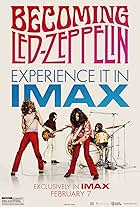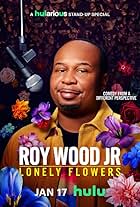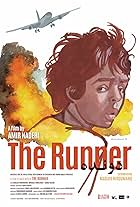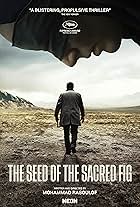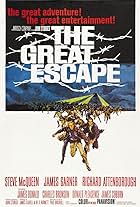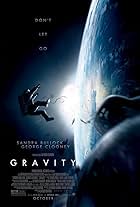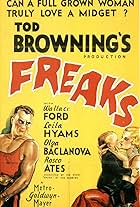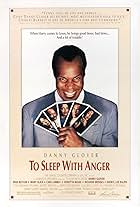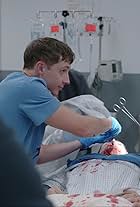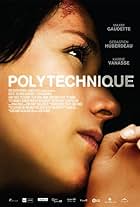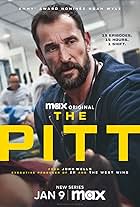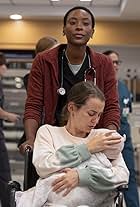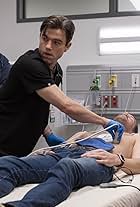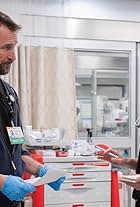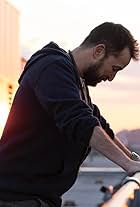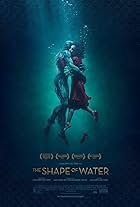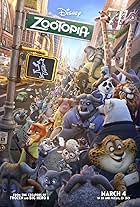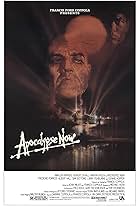
Quinoa1984
Joined Mar 2000
Welcome to the new profile
We're still working on updating some profile features. To see the badges, ratings breakdowns, and polls for this profile, please go to the previous version.
Ratings14.4K
Quinoa1984's rating
Reviews5.3K
Quinoa1984's rating
This is an observational, practically plot-less film where Naderi follows a young boy as he is experiencing things that may be exotic or unfamiliar to Westerners - well, not the praying, that should be familiar, but other things like the gathering in the streets that involves ritualistic self-flagellation to music (that was... wow ok) - and the air of mystery snd revelation is what is so fluid and engrossing here.
I don't think Naderi wants us to understand everything that this boy is seeing and experiencing, but what's important is that he simply is in this world and doesn't turn a eye from the mant birds in his world, the man with the giant hand on the pole he holds up high, the praying, the chanting, everything that he is still trying to figure out. And all the while is that bowl with the ice that is melting ever so slowly (and will he yo get more)?
There's a poetic flow to these observations, even though it is so observational that your mind will wander through the scant 47 minute run time. What carries it is Naderi is concerned with images- especially that one small cat that keeps scampering around - and that concern meaning to make things vivid and vital based on his point of view. I'd also strongly advise watching this after The Runner (you're probably coming to this since its on the Criterion release anyway) as you'll appreciate how much Naderi was already intuitive in framing and cutting.
I don't think Naderi wants us to understand everything that this boy is seeing and experiencing, but what's important is that he simply is in this world and doesn't turn a eye from the mant birds in his world, the man with the giant hand on the pole he holds up high, the praying, the chanting, everything that he is still trying to figure out. And all the while is that bowl with the ice that is melting ever so slowly (and will he yo get more)?
There's a poetic flow to these observations, even though it is so observational that your mind will wander through the scant 47 minute run time. What carries it is Naderi is concerned with images- especially that one small cat that keeps scampering around - and that concern meaning to make things vivid and vital based on his point of view. I'd also strongly advise watching this after The Runner (you're probably coming to this since its on the Criterion release anyway) as you'll appreciate how much Naderi was already intuitive in framing and cutting.
SotSF is pretty great until near the end when the tension started to dissipate (or maybe it is because if you show a gun for that long, the anti-climax of it *not* going off should be earned and I am not convinced this did). Maybe it was seeing so many putting this in the top, top pantheon of the year's films; not only it's Oscar nomination, but the nature of how it was basically smuggled out of the country to be Screened at Cannes (itself a bold and inspiring story to get to where it found distribution for much of the world) brings an expectation, not to mention the run time. The fact that it is really really profound and strong in the ways that matter counts though, especially as a film about family dysfunction and how the roles they've been put into are disastrous.
I loved how the mother was not that sympathetic to the daughters early on, and yet there were more than a few wrinkles in what the filmmaker shows us of the distance between husnand and wife - all those nights where he comes home and she at first stays up but then falls asleep as he is out longer and longer (and to look back after the film is done at those scenes and to understand *why* he was out so long having "meetings" at work adds to the chilling nature of his response) - and that if it wasn't for this missing gun something else was going to break in this family some way. And this is a time period that is not some far off context but a society that is actively in religious oppression and armed to the teeth.
Some of the film is shot fairly standard, coverage being largely shot reverse shot and so forth for dialog, but what's impressive to me is when Rasoulof breaks from this, like when the girl's friend is at the house with the battered face and the mother takes time to pick out the pieces of weaponry from her wounds. That is the most upsetting part of the whole film if I take stock of it all, in how carefully she takes in picking out those pieces, and it's also from here that the mother Najmeh may not say it outright (and she still has a lot of motherly consternation for her daughters after this, especially in the "it'll upset your father" realm, Golestani is in like 6 dimensions with her performance), but she is changed and has to see things differently now. Or will she, is a key question.
It does lean more into a Genre/Thriller kind of story in the last half hour - almost like something out of the Shining if one were to say more like a Horror film (only our dad/husband just has his own maniacal paternal paranoia and self hatred to blame) - and that isn't quite as absorbing as just seeing this family at home. But we do need that moment where the two people following the family on the road confront the dad, for us to see just what extent they are at now in the story, and that it almost has to unravel from there with what the gun is really all about. And all of this with the immediate and harrowing backdrop of the protests and demonstrations of the period, it makes for an extremely satisfying film.
I loved how the mother was not that sympathetic to the daughters early on, and yet there were more than a few wrinkles in what the filmmaker shows us of the distance between husnand and wife - all those nights where he comes home and she at first stays up but then falls asleep as he is out longer and longer (and to look back after the film is done at those scenes and to understand *why* he was out so long having "meetings" at work adds to the chilling nature of his response) - and that if it wasn't for this missing gun something else was going to break in this family some way. And this is a time period that is not some far off context but a society that is actively in religious oppression and armed to the teeth.
Some of the film is shot fairly standard, coverage being largely shot reverse shot and so forth for dialog, but what's impressive to me is when Rasoulof breaks from this, like when the girl's friend is at the house with the battered face and the mother takes time to pick out the pieces of weaponry from her wounds. That is the most upsetting part of the whole film if I take stock of it all, in how carefully she takes in picking out those pieces, and it's also from here that the mother Najmeh may not say it outright (and she still has a lot of motherly consternation for her daughters after this, especially in the "it'll upset your father" realm, Golestani is in like 6 dimensions with her performance), but she is changed and has to see things differently now. Or will she, is a key question.
It does lean more into a Genre/Thriller kind of story in the last half hour - almost like something out of the Shining if one were to say more like a Horror film (only our dad/husband just has his own maniacal paternal paranoia and self hatred to blame) - and that isn't quite as absorbing as just seeing this family at home. But we do need that moment where the two people following the family on the road confront the dad, for us to see just what extent they are at now in the story, and that it almost has to unravel from there with what the gun is really all about. And all of this with the immediate and harrowing backdrop of the protests and demonstrations of the period, it makes for an extremely satisfying film.
To Sleep with Anger is probably the most low-key kind of film that is about a man with a malevolent spirit about him who turns a fairly average middle class African American family's lives upside down. Charles Burnett means to show a sort of story of how folklore is manifested in a sort of realistic setting (this is in a sense the same LA that he shot Killer of Sheep, only now shot in color instead of black and white, though it still looks really good), and I think I was struck by how this is, even with the appearance of Harry (Glover, in a great performance mostly for how subtle he largely is), and slice of life about this family's familial and relationship issues.
There is some surreal and abstract imagery notably in the opening where we see a cursed man on fire without his "Tobey" (that's the good luck charm of a sort, which is what makes Gideon in trouble for much if the film), but it is mostly a fairly typical family drama and it isn't a bad thing but I perhaps expected a little more out of the film. Maybe it comes with that expectation of something a little more special from Burnett, or (and this is my problem not yours) I just wasn't in a great headspace for something as nuanced as this.
What does make this remarkable then? How about some excellent supporting work from Carl Lumbly, Vonetta McGee and Sheryl Lee Ralph (the latter in one of those hair styles that says 1989 and I love that about its specific time and place), or how Burnett adds some mystery that keeps you guessing in a good way about how pervasive Harry will make his influence on the family. I most appreciated that there wasn't one particular thing that made him seem so sinister, it's more like not even a passive-aggressive tone but a sort of simple way of commenting to the characters about this or that, the insinuations that tradition should be paid heed. But when it comes time to have a big drink of some really hard alcohol? He's first in line to pour out to all the house guests around.
If I'm honest with myself, I found some of the interactions midway through sort of dry, this despite there being some conflict involving the parenting (or lack thereof) with some in this family, which leads to a boiling point in the last act. Another positive is that it also comes together as the conflicts come to a head, and the sinister influence of Harry is finally too much especially for Suzie (Mary Alice, also quite moving in her subtle way).
There's a fantastic pay-off involving some items that the boy had earlier, and it shows that Burnett understands giving an audience some conventional pleasures even as he is mostly content to have us hang out with the characters. At the same time, this could improve for me on another viewing (or in a theater with no distractions where Burnett's blues guitar and the lightning effects pay off), and it's certainly a unique effort for its time or any time.
There is some surreal and abstract imagery notably in the opening where we see a cursed man on fire without his "Tobey" (that's the good luck charm of a sort, which is what makes Gideon in trouble for much if the film), but it is mostly a fairly typical family drama and it isn't a bad thing but I perhaps expected a little more out of the film. Maybe it comes with that expectation of something a little more special from Burnett, or (and this is my problem not yours) I just wasn't in a great headspace for something as nuanced as this.
What does make this remarkable then? How about some excellent supporting work from Carl Lumbly, Vonetta McGee and Sheryl Lee Ralph (the latter in one of those hair styles that says 1989 and I love that about its specific time and place), or how Burnett adds some mystery that keeps you guessing in a good way about how pervasive Harry will make his influence on the family. I most appreciated that there wasn't one particular thing that made him seem so sinister, it's more like not even a passive-aggressive tone but a sort of simple way of commenting to the characters about this or that, the insinuations that tradition should be paid heed. But when it comes time to have a big drink of some really hard alcohol? He's first in line to pour out to all the house guests around.
If I'm honest with myself, I found some of the interactions midway through sort of dry, this despite there being some conflict involving the parenting (or lack thereof) with some in this family, which leads to a boiling point in the last act. Another positive is that it also comes together as the conflicts come to a head, and the sinister influence of Harry is finally too much especially for Suzie (Mary Alice, also quite moving in her subtle way).
There's a fantastic pay-off involving some items that the boy had earlier, and it shows that Burnett understands giving an audience some conventional pleasures even as he is mostly content to have us hang out with the characters. At the same time, this could improve for me on another viewing (or in a theater with no distractions where Burnett's blues guitar and the lightning effects pay off), and it's certainly a unique effort for its time or any time.
